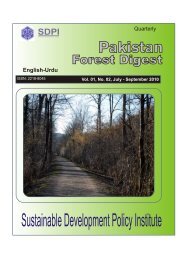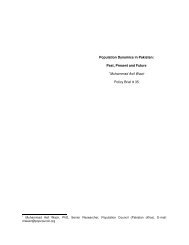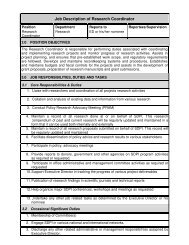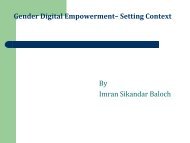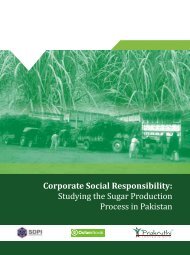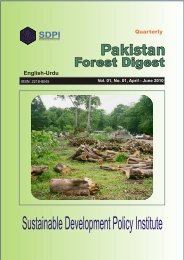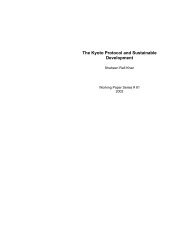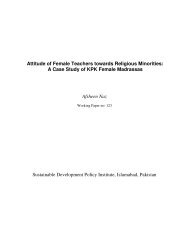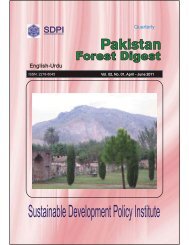Annual Report 2009-10 - Sustainable Development Policy Institute
Annual Report 2009-10 - Sustainable Development Policy Institute
Annual Report 2009-10 - Sustainable Development Policy Institute
- No tags were found...
You also want an ePaper? Increase the reach of your titles
YUMPU automatically turns print PDFs into web optimized ePapers that Google loves.
<strong>Annual</strong> <strong>Report</strong><strong>2009</strong> - 20<strong>10</strong>Assessment of Gender Disparities in Skills <strong>Development</strong> OpportunitiesPrevalence of gender disparities in skill development opportunities in the technical and vocationaleducation and training system and the job market is a known reality in Pakistan. Since thecreation of Pakistan, girls and women have had to face limited access to education and skills.Women have been generally associated with a low level of skills, especially since their work isoften regarded as an extension of their reproductive and domestic roles. Their work-both paidunpaid is thus undervalued and in many instances under enumerated. In instances, wherewoman have skills, then they have limited and less attractive choices in the labour market. Theyoften find themselves in jobs traditionally associated with women, not just because they are consideredto be the weaker sex, through ingrained cultural traditions and beliefs, but also becausethey generally gain access to skill training opportunities within a limited range of occupations.It is in this context ILO entrusted SDPI to assessing gender disparity in skills development opportunitiesin three provincial capitals i.e. Lahore, Karachi & Peshawar. The assessment is mappingthe existing employment opportunities available to girls and woman within the respectivedistrict.The target stakeholders will be training providers (public and private sectors) job providers oremployment exchanges in public and private sector and beneficiaries who are either trained orintend to get trained (preferably an equal number of men and women). These stakeholders willidentify gender issues regarding appropriateness of skills / trainings to facilitate accessibility tothe job market.Methodological framework or instruments for data collection of the research study will be basedon Collection and Review of Secondary data, Collection of Primary data, Consultative/Stakeholders Workshops, Focus Group Discussions (FGDs), Informant Interviews and casestudies. The findings of the study would not only help ILO in its future interventions to reducegender disparities in skill development opportunities but will also be forwarded to relevant policymakers for their attention.For further details contact Mr. Gulbaz Ali Khan gulbaz@sdpi.orgGender Disparity in Primary and Secondary School Attendance Ratio In Chakwal andVehariThe literacy rate in Pakistan is extremely low, only 60 percent of all school going children aged(5-14) attend primary school. The ratio of girls enrolled in primary education is much lower thanboys. Only 56 girls for every <strong>10</strong>0 boys attend primary school. This situation becomes worse atthe middle and secondary tiers of schooling. An increase in dropout rates and a decrease in enrolmentrates becomes prevalent especially in the case of girls. Limited access to schools, thetraditional view of girls as purely home bodies and security concerns are considered as factorsthat have an adverse effect on their education.To find out the exact reasons associated with non-enrolment and drop-out rates of girls at primary,middle and secondary levels of schooling, Plan Pakistan has initiated a study in consultationwith the SDPI. Outcomes of the study will be used by Plan Pakistan to develop its programmeto address the root causes of the issue, and for developing a stronger campaign ongirl's education and protection and to link it with the Plan international campaign “Because I Ama Girl (BIAAG)”. The study will focus on Plan Pakistan's operational areas such as District Chakwaland District Vehari.Literature review and desk reviews are underway and SDPI has organized some focus groupdiscussions to finalize its preparation before primary data collection & its analysis.For further details contact Mr. Gulbaz Ali Khan gulbaz@sdpi.org30S u s t a I n a b l e D e v e l o p m e n t P o l I c y I n s t I t u t e



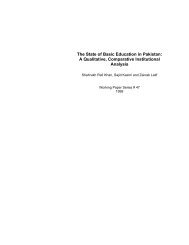
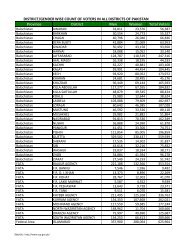
![(October - December, 2010) [13th SDC Special Bulletin]](https://img.yumpu.com/50118608/1/184x260/october-december-2010-13th-sdc-special-bulletin.jpg?quality=85)
